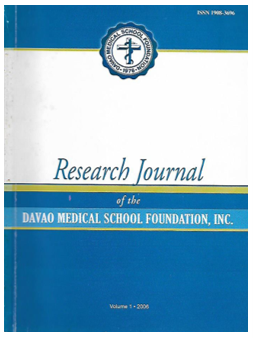AUTHOR
Mila O. Maruya MPD, MCH, MHPEd
KEYWORDS:
learning performance, medical school, intervention program
ABSTRACT
With increased dependence on student enrolment to finance the continued viablity of the Davao Medical School Foundation, Inc. (DMSFI), the school confronts a dilemma now afflicting many institutions of higher education in the Philippines. The entry of students who could be considered academically challenged or underachievers poses the challenge for DMSFI to find ways to improve their performance and attitudes towards learning to enhance their chances of retention. This study was conducted in response to the need ot examine the effects of an early intervention in the performance, attitudes towards learning, and level of confidence in class of academically low-perofrming medical students. Using the preliminary examination in Physiology as the pretest, the twenty-two students who failed it were subjected to an early intervention program. Their academic performance was monitored, with their scores on the four subsequent quizzes serving as the posttest measures, along with their ratings on the midterm and final examinations. Comparison of the actual ratings in the pretest and posttest showed both individual and group improvement in the students’ performance. Comparison of means of the two groups indicated positive outcomes from the intervention. The analysis of variance (ANOVA) showed a significant difference in performance in all subsequent quizzes and exams, except for the second quiz. Pretest and posttest measures were also derived for the students’ attitudes towards learning and their level of confidence in class prior to and right after the intervention. Using the Wilcoxon signed ranks, results showed that early intervention had a significant effect on the students’ attitudes toward learning and their level of confidence when attending class. It is recommended that an early intervention program be instituted for low performing students. Instructors should adjust teaching strategies more in line with the learning styles of low performing students. Prompt feedback and reinforcement to students should be a matter of school policy to enable DMSFI to achieve its goal of generating competent and committed graduates who will serve the communities of Mindanao.


